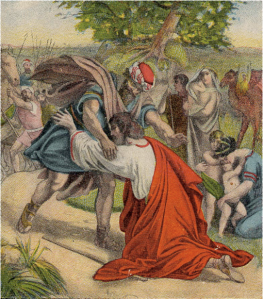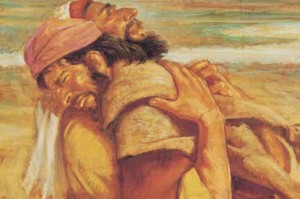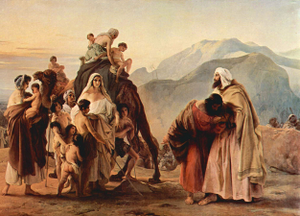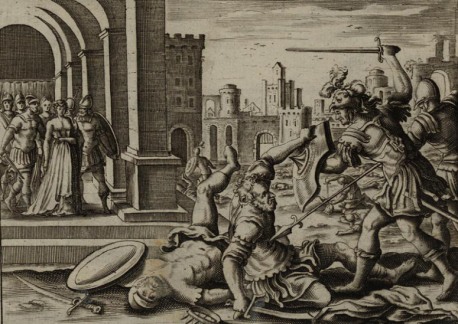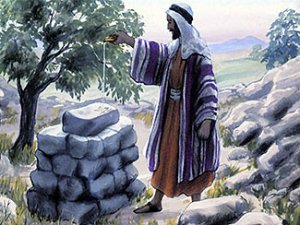Now Jacob begins to send gifts to Esau—not paltry, but substantial ones. The servants come back and report that Esau is on his way with 400 men. Jacob is seriously concerned. He divides his camp into two . . . hoping that at least some can escape his brother’s wrath. He offers a humble prayer to God for help. He sends another gift to Esau . . . a clue of his riches: 200+ goats, 200+ sheep, 30 camels with babies, 50 head of cattle, 30 donkeys. He sends them forth one drove at a time, hoping to soften Esau’s heart.
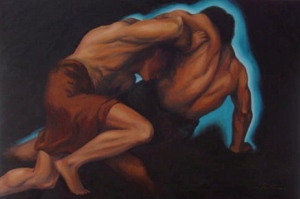 Then he moves his camp over the river Jabbok. He remains behind to wrestle, in more than one way, with the Lord. Some have made out that in moving his family ahead of him he was cowardly. Not so. He loved his family. But he wanted to be alone to talk with God, probably more profoundly than ever before. Genesis 32:24 says that he wrestled with a man. This “man” had God’s authority to bless Jacob. Jacob’s name is changed to Israel, and he is given a blessing, and a reassurance that God has taken up his cause. Jacob asks the “man’s” name—it seems he gets no answer, but Jacob says, “I have seen God face to face, and my life is preserved.” (Genesis 32:30) It’s not just a dream or a vision, because Jacob walks away with a limp.
Then he moves his camp over the river Jabbok. He remains behind to wrestle, in more than one way, with the Lord. Some have made out that in moving his family ahead of him he was cowardly. Not so. He loved his family. But he wanted to be alone to talk with God, probably more profoundly than ever before. Genesis 32:24 says that he wrestled with a man. This “man” had God’s authority to bless Jacob. Jacob’s name is changed to Israel, and he is given a blessing, and a reassurance that God has taken up his cause. Jacob asks the “man’s” name—it seems he gets no answer, but Jacob says, “I have seen God face to face, and my life is preserved.” (Genesis 32:30) It’s not just a dream or a vision, because Jacob walks away with a limp.
Next morn comes Esau with his 400. Jacob sets the maids and their children first, then Leah and hers, and lastly Rachel and Joseph. Then he goes out in front of them all to confront his brother. He comes forward, bowing 7 times as he comes toward Esau. Esau comes running forward and embraces him. The men weep for all that has passed between them, and after all, they are brothers.
Esau looks amazed at all that Jacob has with him. What’s all this? He asks, knowing the answer. Jacob brings forth his family, who all bow before Esau in respect. Esau says, What were all those droves? Jacob says, They are gifts in askance of mercy/forgiveness. Esau says, I’ve got all I need, keep them (but he is no doubt pleased to have been offered them). Jacob says, No, please, take them. It is worth it to me to see your face in kindness to me. God has blessed me greatly these years, and I have enough. Whether it was a cultural way to refuse until pressed or not, Esau at last accepts the gifts. Esau offers to ride with his men as an escort, but Jacob feels it best to part as friends and not take the chance of falling out—so he excuses himself by saying that with all the little ones, it’s better that the make their way slowly. He’ll bring them down to visit in Seir eventually. And Esau leaves for home (Seir).
Jacob builds a house and booths for his animals at Succoth, by the Jabbok River, on the east side of Jordan river; then buys some real estate in the area of Shechem on the west side of the Jordan River to set up camp. He builds there an altar—a place of worship.
Jacob’s daughter, by Leah, goes into town (Shechem) to visit the girls there—perhaps by invitation. A young man of the court, or a prince, Shechem, finds Dinah attractive, and takes her virginity. He falls in love with her (speaks kindly to her . . . perhaps consoling her, in her grief over what has happened to her, and what it means for her life—dishonor/shame, no honorable marriage, being “damaged goods”), and speaks to his father Hamor about getting her as a wife. His father goes to Jacob and asks for her. Jacob doesn’t say much until his sons return from the field (possibly around Succoth they are keeping their herds/flocks?). When they hear about it they are incensed. But they come up with a strategy. They tell Hamor and Shechem that if they’ll be circumcised they can intermarry. Shechem is more honorable than the rest of his father’s house, and loves the young woman, and agrees.
But how will they convince all the rest of the guys back in town? They meet at the gate of the city. They say, Look guys, let’s go ahead and do this—we’ll trade and intermarry, and eventually everything they have will be ours. So they all agree. Simeon and Levi take advantage of their soreness on the third day, slaughter all the men, capture all the women and children, and all their wealth (no doubt it wasn’t just the two of them, but they had a number of servants, and perhaps brothers along—but they were the leaders, being Dinah’s brothers). We don’t know whether they kept all the captives, or sold them as slaves.
Jacob wasn’t happy with Shechem’s action, but he’s not too happy with his sons’ reaction—he’s afraid all the people around will form an alliance, take vengeance, and wipe his family out. In the reality of the danger, he has for the moment forgotten the reality of God’s promises. But Simeon and Levi aren’t apologetic. They don’t want anyone taking advantage of their sister, nor thinking they can get away with treading on their family toes.
Probably Jacob took his worries to the Lord, because next chapter (Genesis 35) the Lord tells him to move on to Bethel, maybe 20 miles south, live there and build an altar/place of worship, the very place he had dreamed of the ladder to heaven, and been reassured by God of His Covenant, and Jacob had vowed himself to God.
Jacob recognizes the need for his family/household to divest themselves of offenses to God, He calls on them to clean up their act: turn in all their idols (whether these are among the family, who were, after all, raised in the household of Laban, who had idols; or just among the servants . . .), (probably wash and) change clothes . . . and return to worship God, who has taken care of Jacob all these years. They turn in all their paraphernalia and Jacob buries it all under an oak at Shechem—maybe the influence that got them into trouble—they bury their old life, and hopefully start a new. The episode with Dinah has been perhaps a wake-up call that he needs to get his large family in order.
Much less than facing a confederation of local inhabitants, everybody around keeps clear of Jacob and his family, having heard what happened at Shechem. Jacob “and all the people that were with him” (Genesis 35:6) sounds like they were no small group—not necessarily a crowd to mess with.
At Bethel Jacob builds an altar/place of worship. Deborah, Rebekah’s nurse died and was buried there. Surely she didn’t just die . . . Rebekah was Jacob’s mother, and her nurse would have been like a grandmother to him. If Jacob was 130 when Joseph was close to 40, and Joseph was born in Padan-Aram, then Jacob is over 90 years old at this point. It’s possible there was a mix-up of whose nurse . . . could have been Rachel’s maybe. Or just that Rebekah’s nurse had been buried there long before.
God appears again to Jacob, reaffirms his name change to Israel, and God’s covenant with him.
It doesn’t say how long they stayed (“dwelled”—Genesis 35:1) in Bethel (maybe not too long if they made it to Hebron by the time Joseph was 17; see below), but then they move on south toward Bethelehem (near Jerusalem), and on the way Rachel bears her second son she was sure she would have, and dies. Jacob names him Benjamin. Not sure why he didn’t take her to be buried at Hebron/Mamre, where he seems to be headed . . . surely they could have made it in a day or so . . . was there something about her death (bleeding, etc) that made it either culturally at issue or a health issue? Maybe with such a crowd they couldn’t make it in a day or two. Was it that only the first wife was buried in the family plot? In any case, Rachel was buried near Bethlehem, which brings interesting ideas to the mind, and Jacob built a memorial there for her, that was kept over the years.
They continue south, and stay awhile at a place called Edar, where Reuben made a mistake with his father’s concubine, Bilhah (Rachel’s maid). No comment about whether he seduced her, or she him (she being obviously the older woman, but he was a grown man himself—probably in his 30s), or whether it was a mutual fling. Jacob heard about it—it can’t have been good news to him, or endeared him to his eldest son.
Jacob finally makes it to Mamre/Hebron. Genesis 37:14 indicates that it was while they lived there that Joseph was sold into Egypt, at age 17. Isaac didn’t die until Joseph was 30, so it sounds like they lived there at least 13 years before Isaac’s death. Jacob and Esau together buried their father Isaac in the family burial ground Abraham had purchased.
So now 3 generations of the family have lived various places in Canaan—sometimes apparently on unclaimed grazing land, but at least two places were purchased. Sichem/Shechem, Bethel, Hebron, Beer-sheba (and now Succoth, on the other side of the Jordan River) are a part of the family heritage.
A record was kept not just of the direct covenant line, but it was considered important enough to keep the genealogy of the extended family as well. But that would be for another day. (Genesis 36 outlines Esau’s family)


